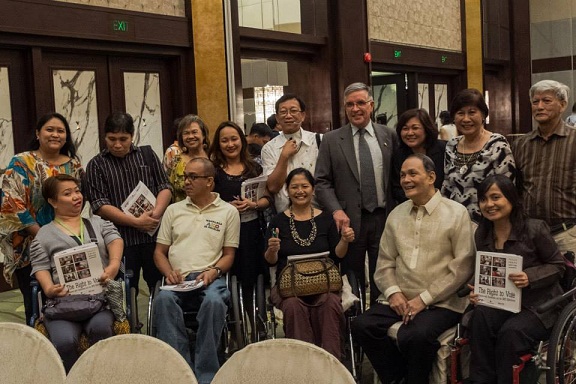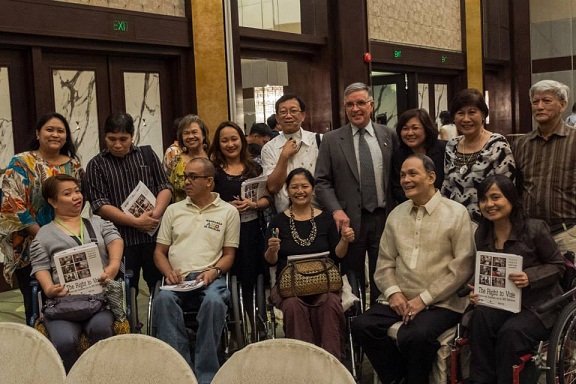
By MELISSA LUZ LOPEZ
FOLLOWING the experience of persons with disabilities (PWDs) during the 2013 polls, much needs to be done to make the 2016 elections more accessible, according to a book recently published by The Asia Foundation.
The Right to Vote: Filipinos with Disabilities and the 2013 Elections, produced by VERA Files, evaluates the conduct of the May 13 national elections and the October 28 barangay polls for PWDs, as documented by VERA Files. It also covers the special voters’ registration for PWDs held in 2012.
A civil-society initiave, The Fully Abled Nation (FAN), which aimed for disability-inclusive elections in the country was launched in March 2012.
Australian Ambassador Bill Tweddel said the FAN initiative fits with Australia’s policy that development” must take account of people with disabilities to ensure that we ‘leave no one behind.’”
TAF Country Representative Steven Rood, said the campaign for the participation of PWDs in elections is not about “charity or optional assistance to particular sectors.”
“We are talking about the rights of individuals, and citizens’ rights are grounded in their right to vote to choose their leaders and the policies that the government will follow.”
 The book showed that despite the collective effort of government and civil society groups, accessibility remained a major problem in the conduct of the 2013 elections.
The book showed that despite the collective effort of government and civil society groups, accessibility remained a major problem in the conduct of the 2013 elections.
In 2013, the Commission on Elections (Comelec) designated only two accessible polling places (APPs) for the May 13 elections and four during the October 28 elections, much to the dismay of PWDs and advocates.
The so-called pilot areas, however, posted a very low turnout, as only 10 PWDs voted in the four SM malls chosen as APPs in October.
Still, Comelec prides itself for being given an Accessibility Award by the London-based International Centre for Parliamentary Studies in December 2013 for the conduct of the midterm polls.
Director Esmeralda Ladra of the Comelec Law Department said the book’s findings would “serve as a guide” for the 2016 elections and would be used to improve the poll body’s services.
“Na-start na ito [campaign for PWD voting] at magandang ipagpatuloy until such time when if not all, at least majority of the PWDs and senior citizens will be able to avail of our electoral process. We don’t want to go back to that time when very few lang ang nakaka-avail,”she said.
Ladra said it would be up to the Comelec en banc to decide if malls and public schools will again be assigned as APPs for the 2016 elections.
President Oscar Taleon of the Alyansa ng may Kapansanang Pinoy (AKAP-Pinoy) believes that the uproar of the sector on the rejection of their partylist during the 2010 national elections served as a “wake-up call” for Comelec to finally respond to the concerns of PWDs.
Following AKAP-Pinoy’s recommendations, the poll body appointed then-Commissioner Rene Sarmiento as the focal person for PWD voting in 2011. Various resolutions were also approved to address PWD concerns, providing for special satellite registrations and APPs, to name a few.
“It is incumbent for us from the sector to be in the lead in the struggle for making our right to vote real,” Taleon said.
While there are enough laws upholding PWD rights and welfare, enforcement remains a setback as some government officials and even members of the sector seem to be unaware of these provisions, according to book editor Luz Rimban.
The country’s most recent census in 2010 recorded 1.443 million PWDs, or 1.57 percent of the population. The number of registered voters with disabilities, however, stood at 362,113 as of October 2013.
Aiming for a more PWD-inclusive 2016 elections, the campaign will now be geared towards informing the greater public, said Maribel Buenaobra, TAF Director for Programs and one of the book authors.
“It’s not only about elections… [It’s about] people who cannot claim their right because there is no enabling environment or opportunity for them to claim their right,” she said.
